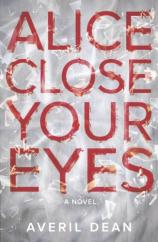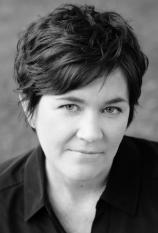Interview: January 9, 2014
In 2012, after spending 20 years working in an office, Averil Dean decided to pursue her dream of writing full-time. Her efforts, it seems, have paid off with her buzzworthy debut novel, ALICE CLOSE YOUR EYES. It’s an erotic psychological thriller about Alice Croft, whose lust for revenge becomes complicated the night she breaks into Jack Calabrese’s house --- and starts lusting for darker and more dangerous things. In this interview with Bookreporter.com’s Norah Piehl, Dean talks about her obsession with all things noir, as well as how her fascination with “the interplay between deviant minds” led her to write the book. She also explains how she was able to successfully give life to an unlikable protagonist, why her personal blog is like a “lifeline,” and the reason that more women --- especially after the success of FIFTY SHADES OF GREY --- are jumping on the erotic fiction bandwagon.
Bookreporter.com: What drew you to the genre of psychological suspense for your debut novel?
Averil Dean: Actually, it was a suggestion from a writer friend, who liked the noir-ish tone of my erotic stories and thought it might translate well into the suspense genre. I don’t read many straight-up crime thrillers because I’m not all that interested in procedurals and the inner workings of investigation. I prefer personal, private crimes and the interplay between deviant minds. Psychological suspense is the perfect venue for that, and the genre leaves a lot of room for dark-minded characters straddling the margins of society.
BRC: What was the inspiration for ALICE CLOSE YOUR EYES, particularly for the vivid and suspenseful opening chapter in which Jack discovers Alice, who has broken into his home?
AD: A few years ago, I happened upon a black-and-white neo-noir film called Following, in which the main character picks out strangers on the street and later begins breaking into their homes. His behavior arises from a strange kind of voyeurism, which seemed so perverse and sexy that I knew right away I wanted to do something with it. The story of Jack and Alice grew from that original idea, as an exploration of the longing and insatiable curiosity people have about one another.
As for the first scene, I couldn’t think of a better way to introduce these characters to each other and to the reader than to have Alice get caught in the act. It set them off balance from the beginning, and also felt like the true beginning to the story.
BRC: Alice is a complicated character with a pretty involved backstory. How did you come to know her? Were there any aspects of her character that were particularly challenging to convey?
AD: She was elusive. I struggled for about three months just trying to let myself write a character this dark. I judged her constantly, and judged myself for writing her. I imagined, perhaps correctly, that people would dislike her, and I found that a difficult thing to allow.
To get around myself, I made some changes to the narrative voice. I started writing in first person, present tense, which gave me the freedom to say without judgment: This is what’s happening. I didn’t need to explain anything beyond that. This shift in perspective gave me the mental space to simply write her story as it unfolded, and allowed me to step away from myself and into the character. Now I use this tool all the time, even when I know the end result is going to be a third-person narrative.
BRC: You've written erotica before, and there are certainly many erotic and sensual elements in the book. How did you see these components functioning in the novel's plot and themes?
AD: I don’t think I could have told this story without the erotic content. I discovered so much about the characters while writing those scenes. I was interested in the way their mutual distrust manifested sexually, the means each of them would use to try to control each other, themselves and the situation.
And I have always been fascinated by the darker side of sex, in which people are driven by physical need to reveal themselves to partners who can’t truly be trusted around that kind of vulnerability. The sexual relationship between Jack and Alice gave me a place to explore the danger and tragedy that can arise from the simple act of trying to know another human being --- or assuming that you already do.
BRC: The popularity of novels like FIFTY SHADES OF GREY seems to have made it acceptable for women, in particular, not only to admit to reading erotic fiction but also to admit that they enjoy it. Why do you think this change has happened now?
AD: eReaders. I know I’m not the only woman who is uncomfortable taking a book to the counter with a shirtless hunk on the cover and a title that makes me blush while the cashier’s scanning the bar code. I don’t want to leave erotic books around the house where my kids can find them, or sit with my book splayed out at the office lunch table when my boss pulls up a chair. eReaders allow women to enjoy erotic fiction privately, and I think what we’re seeing is the collective relief of all of us discovering together that we kind of like to read smut. Safety in numbers, I guess.
BRC: ALICE CLOSE YOUR EYES is set in the Pacific Northwest, where you also moved relatively recently. How did setting your novel in this part of the country help you understand the region better?
AD: I wrote ALICE while my family was still living in Las Vegas, where I was born and raised. The book describes a romanticized version of Vashon Island, not entirely accurate, but I have to say that even since moving to the area, the romance for me has not faded. I still walk in the forest every day and look up into the pines and feel that snug little glow of happiness at the beauty of it all.
BRC: Tell us what your writing process is like, especially in a novel like this one that includes elements from the present day but also lots of insights into the main character's past. Do you start out with an outline, a chronology, or do you just dive right into it?
AD: It’s different with every book. The only consistent part of my process is that I write the first rough pages of a scene longhand, in a cheap spiral notebook. The writing is a huge mess, with lines and phrases scribbled out, and doodles up the margins, misspellings and poor grammar and all the rest of it. But those pages pull me through the terror of facing a blank computer screen, and they are portable enough for me to drag around to cafés and restaurants where I like to write.
With ALICE, I wrote a lot of scenes and characters that never made it beyond the first draft. I find it helps to just throw down whatever comes to mind, anything that seems as if it might add to my understanding of the characters. After I’ve accumulated about 30-40,000 words, I begin pulling out the usable material and assembling it into my revised idea for the story. By now I have a clearer idea of what I’m doing, so I can simply keep adding material from this point on until the book is finished.
BRC: Many writers relish the revision process while others see it as a necessary evil. Where do you fall on that spectrum?
AD: Revision is writing. It’s all the same to me, and it’s all really hard.
BRC: How have you found the publication process? What aspects of having your first novel published surprised you?
AD: That it was pleasant. Like most writers, I’ve heard a lot of horror stories about publishers who took a writer’s book in the wrong direction, or gave it an awful cover, or made the writer feel the whole project was out of her control. My editor, Michelle Meade, has been wonderful all the way through. She knew exactly what my story needed and helped me understand the characters in a way I hadn’t before. I know there must be a veritable army behind the scenes, working to put a book together, but Michelle has always provided a place of shelter where I could set all that out of my mind and just write. I’m very grateful.
BRC: You have an entertaining (and, as you say, definitely "not safe for work") blog. What's the relationship between the writing you do for your blog and your fiction writing? Does one influence or enrich the other?
AD: I suppose the blog does enrich my fiction writing --- I think all writing is helpful in that way --- but honestly it’s more of a lifeline. I blog because I enjoy conversation, so I keep my posts fairly short and invite people to comment. We have a community of regulars, but I always get excited when someone new drops by for a visit.
BRC: What have you enjoyed reading lately? What books would you recommend for readers who enjoy your novel?
AD: I’m a fiend for anything noir. THE BEST AMERICAN NOIR OF THE CENTURY is a particular favorite, though at the moment I’m reading one of the Akashic series, USA NOIR, which is giving it a run for its money. I loved GONE GIRL by Gillian Flynn, THE SILENT WIFE by A.S.A. Harrison, PROMISE NOT TO TELL by Jennifer McMahon and Vanessa Diffenbaugh’s THE LANGUAGE OF FLOWERS, and I’m steadily reading my way through the works of Patricia Highsmith and Joyce Carol Oates. I like gentler books, too, but these are the ones that feel closest to my sensibilities as a writer.
BRC: I know that ALICE CLOSE YOUR EYES was sold to your publisher as part of a two-book deal. What can you tell us about the other book?
AD: The book I’m working on tells the story of a triple murder in a remote Colorado ski town, the implosion of a twisted love triangle. The narrative begins with the crime and works backward in time, to explore the characters’ tangled relationships and discover where it all went wrong. Like ALICE, the story is sexy and dark, but more of a mystery than a thriller this time.




